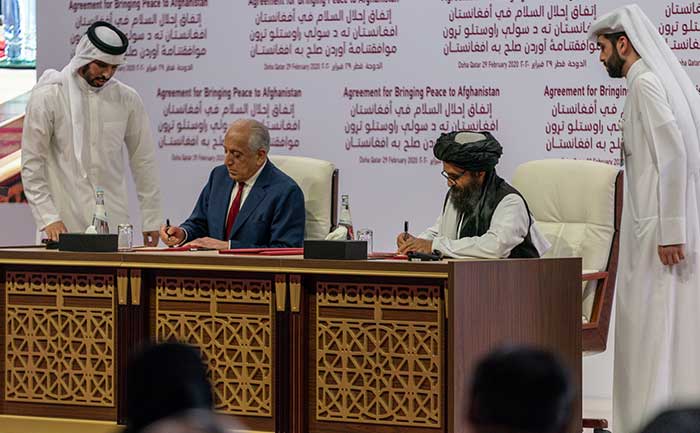
The agreement between the Taliban guerrillas (the self-described Islamic Emirate of Afghanistan) and the U.S. government, signed this weekend in Qatar, is primarily an act of propaganda for both sides. With this pact that supposedly ends a war of over 18 years, Donald Trump is looking for a foreign policy victory, real or apparent, in light of his reelection campaign.
Today, Trump wants to be able to claim that it is he who officially ended the longest war ever waged by the United States.
From the Taliban’s point of view, this agreement, signed with great fanfare and with a high-ranking American representative — Zalmay Khalilzad, ex-ambassador to Kabul, Baghdad, and the United Nations — is an unexpected blessing.
At the expense of an absent and helpless official government, the Emirate officials are seen as the “true interlocutors,” authentic representatives of the Afghan people. This is so despite a clause in the agreement (repeated in almost every paragraph of the text) that specifies that “[t]he Islamic Emirate of Afghanistan … is not recognized by the United States as a state and is known as the Taliban.”
Cynics will see this as a simple attempt to hide defeat. After 19 years, the radical Islamists that the United States drove from power in 2001 after the horror of 9/11 — the product of a conspiracy between the Taliban in power in Kabul and al-Qaida established in that country after 1996 — have, according to independent estimates, retaken control of over 40% of Afghanistan. The insurgents, for their part, boast of occupying two-thirds of the territory.
According to the four-page agreement, “the Taliban will not allow any of its members, other individuals or groups, including al-Qa-‘ida, to use the soil of Afghanistan to threaten the security of the United States and its allies.”
This is the promise in exchange for which the U.S. feels authorized to withdraw as quickly as possible — the deadline is about one year for the 12,000 or 14,000 Americans still present — while the humiliation of their signature and departure conditions as much as possible.
Now, one of two things may happen. First, this agreement might just be one of many pieces of paper which does not really signify the end of the American presence. After the signing, Washington clarified that any failure on the Taliban’s part could void the agreement.
Or, there really will be a departure of troops by the spring of 2021, which will leave the official Kabul government extremely vulnerable, faced with a sanctified and triumphant guerrilla group … which got the Yankee troops to leave for the price of a few verbal concessions.
This agreement is a slap in the face for Kabul “authorities,” proof positive that they’re worth peanuts in the real balance of power in Afghanistan.
The signed text has rules which detail matters such as prisoner exchanges, with numbers, and the schedule of talks beginning March 10 between the government and the Taliban.
President Ashraf Ghani — himself challenged by his ex-prime minister, who claims to have won the presidential election in September despite (probably doctored) official results to the contrary — immediately questioned the agreement.
Speaking yesterday at a press conference shortly after the signing of the agreement, he said that these details — and many others — had been decided over his head, and that he would not let this pass. You can understand his sense of humiliation.
In Kabul and elsewhere, you can especially understand the weariness and despair of Afghans — and especially, of Afghan women — who see the hideous mask of radical Islam and an endless war returning to the horizon.
All that for this. Eighteen and a half years, $1 trillion up in smoke. And Pashtun Islamists, who have laughingly repeated, just as they did with the Soviets, “You have the watch, we have the time.”

Leave a Reply
You must be logged in to post a comment.